Thomas E. Ricks's Blog, page 217
November 17, 2011
Col. Abrams on firepower and mobility
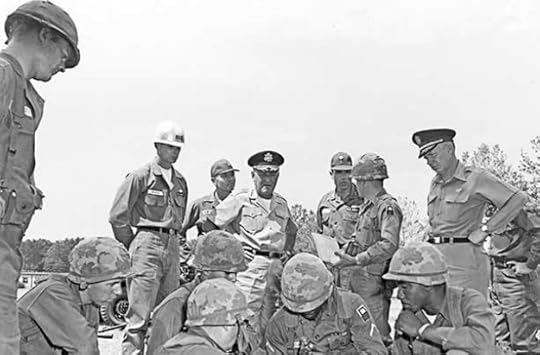
While
I was doing some hole-plugging research the other day at the Army's great
Military History Institute (and also having a few Belgian beers with a few Best
Defenders), I read Col. Creighton
Abrams' 1953 Army War College paper on "Mobility and Firepower."
The
paper is well done, reflecting critical thinking and informed analysis. I
wouldn't call Abrams an intellectual--he actually writes better than most of
that sort, with clear sentences and verbs pushing nouns along the page. "There
is more to mobility than a truck that will go 40 mph or a tank that will go 25
mph. It is more than good planning, more than tanks themselves. It is even more
than movement alone, because there must be power with movement." (P. 7)
So
what is firepower and mobility all about? Not unlike Andy Krepinevich, Abrams
emphasizes organization (logistics, reconnaissance, protection by infantry),
and communications. "In the German attack in France, in World War II, the
French had twice as many tanks as the Germans (4500-2200). In addition, the
French tanks were superior in armament and armor. Guderian credits much of the
success of the German operation to its superior communications, an item on
which the Germans had spent much time and effort." (P. 9)
By
the way, to file under the "it can happen to anybody" heading: The printed
title page of the paper identifies Col. Abrams' branch as "Infantry." This has
been crossed out and corrected. I liked this because I used to remind myself as
a reporter when I was getting messed around by the Army that it wasn't personal,
they treat everyone this way. Even old Thunderbolt. (Except for when they
basically threw out my FOIA requests filed when I began writing 'Fiasco.' In
that case, I suspect that for several years during the reign of Rumsfeld the
Loud, the Pentagon engaged in reckless disregard for the law in the way it
handled FOIA filings. After the book was published I got a response basically
telling me to get lost with my FOIA requests.)
The legend of Squeaky Anderson, the poacher of Alaska -- and a Navy officer

Another
thing I read at Carlisle was the oral history of Lt. Gen. George Forsythe, who
during World War II served for a bit in Alaska, and in the 1970s helped create
the All Volunteer Army.
Forsythe
was impressed that when the Navy began planning amphibious operations in the
Aleutians, it sought out a fish poacher named Squeaky Anderson,
who made his living seining in areas that legally were limited to fishing by
Native American tribes, as well as by poaching sea otter pelts and such, and
sometimes selling rotten salmon, and perhaps
walking off with anything that wasn't nailed down in the harbor. In the
process of poaching and evading the Coast Guard, Forsythe said, Anderson had
learned all the rocks, reefs, currents, and hiding spots along the islands. The
Navy made him a lieutenant commander, and Squeaky brought along his little
fishing boat on a lot of the subsequent operations, in part because that is
where he kept his booze.
Apparently
the short, fat Anderson went to become a respected beachmaster in several
Pacific landings, most notably Saipan and Iwo Jima, where he was instant
recognizable for his usual uniform of cut-off shorts, dirty baseball cap, black
shoes, and red face.
A few words in defense of West Point: They sure do Model United Nations well
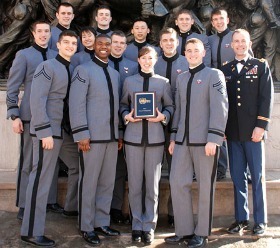
I've
bashed West Point and the rest of the professional military educational
establishment quite a bit in this blog, so I welcomed this chance to let a CNAS
colleague say a few nice words about the USMA.
By
Peter Bacon
Best
Defense guest columnist
Last
week the program Parks and Recreation showcased one
of the nerdiest extracurricular activities of all: Model United Nations.
This activity, known for its geeky high school and college students and its
focus on international affairs, offers some surprising insights into the state
of civil-military relations and international affairs education in this
country. I know -- I spent three years in college competing as a delegate.
At the college level, some of the best teams for Model UN
are from our military academies. West Point's team is consistently rated as one
of the best programs in the country; the other service academies that field
teams, the Air Force and Naval Academies, always put up solid teams and
delegates. In part, these delegates excel because they are instructed in
leadership in the classroom and on the parade field. Nice uniforms, including
the renowned cadet gray, also help make a good first impression. But most of
all, these delegates excel because they know just that much more about the military-aspect of international affairs
than the average college student. Civilian delegates understand the bare
minimum of military culture and tactics: civilians will illustrate their basic
grasp by making arguments in committee amounting to "bomb this, not that" or
"move X troops here." Service academy delegates, meanwhile, will explain
complex military and diplomatic operations to committees ranging from 30 to
300. Routinely, this means that civilian students fail to question any
military-related policies of West Point or Naval Academy delegates. As a
testament to this, most committees will give a military delegate a portfolio
related to the military, such as Secretary of Defense or a military commander.
It's not hard to see why this happens: civilian students
simply do not learn anything about
this facet of our society. Foreign policy classes focus more on flighty theory
than actual practice. History classes barely focus on hard
military or diplomatic history. When I led delegates as an undergraduate,
one of the things that I struggled with was teaching freshmen straight out of
high school about general military capabilities simply because they knew so little about the topic.
The service academies, specifically West Point, are trying
to correct this educational imbalance: West Point's Model UN team set up its own
conference, dedicated primarily to educating civilians about the military.
I had the privilege of attending the conference in April: the Cadets made a
great effort to create realistic committees and instruct civilian students
about the military. From panels and speakers to eating alongside cadets and
learning about military culture and doctrine, the conference was, by the
accounts of my teammates, both "fantastic" and "eye-opening."
West Point has hopefully set a precedent that will follow:
directly engaging civilians, in an era when few ever interact at length with
members of our military, may be the only way to get them educated about
military affairs.
November 16, 2011
How to fix the Army in 66 easy steps (I)

By "Petronius Arbiter"
Best Defense department of Army affairs
A few small things, some annoyances, and some big fixes that
could make a good Army better:
Philosophy
CSA
position needs to be Commandant-like, commanding the Army, not just directing
the Army staff, assigning Generals or formulating the Army budget. Army
structure should empower him to do so.
Don't
be afraid to admit mistakes, acknowledge that the institution made a mistake
and then fix it, even if it means going back to the way something was in the
past or even getting a black eye.
Do
not, I say again, do not, have a regulation/policy/or law that you are
unwilling or reluctant to enforce; examples, enforcement of the height/weight
program, or the prohibition of cell phone use in moving autos. To do less is to
violate the first principle of leadership and makes a mockery of the
institution. Enforce unilaterally, not out of convenience. Perfect example is
the inability to enforce the Army height/weight standards in order to maintain
force structure manning for deployments. Cynics develop over things like that.
Eliminate
NCO business or NCO time as an institutional mantra. It becomes Army business
or all our business, focused on one solution and focus.
Do
nothing in the Army that does not build soldiers' and officers' confidence in
themselves and their units.
Gray and strategy (V): A rare lapse in his understanding of the American psyche
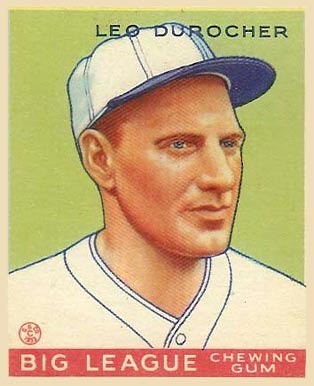
Colin
Gray concludes his 30th maxim, about the persistence of thuggishness in
world politics, with this quotation: "Nice guys finish last." He attributes
this to "Popular American saying."
This is one of the rare lapses in his
book, and a bit ironic given his emphasis on the need for cultural
sensitivity in making and implementing strategy. In this case, he gets the
words right but the attribution wrong, and if you know your baseball history,
that's significant. The crack about "nice guys finishing last" is not a folk
saying broadly popular with Americans, it was an riposte made by Leo Durocher,
a brawling baseball manager with a distinctly dark view of the world -- and of how to play
baseball: "Win any way you can as long as you can get away with it." So I
would say that the comment isn't so much reflective of American views -- which
tend to be more optimistic, law-abiding and meliorist -- as of the hard-bitten
minority that believes that to get along in the world, you have to kick, bite
and gouge every inch of the way. Or, as Durocher once confessed, "If I were
playing third base and my mother was rounding third with the run that was going
to beat us, I would trip her."
North Korea: Land of totalitarian magic
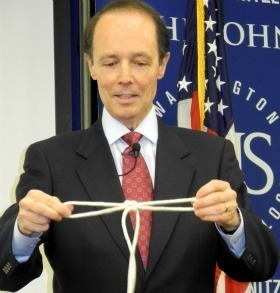
By Joseph Natividad
Best Defense Pyongyang deputy bureau chief
An English literature professor from Southern California by day and a
world-class magician by night, Dale Salwak holds the distinction of being the
only American invited to perform his act in North Korea. At SAIS recently,
Salwak chronicled his experiences in Pyongyang in 2009 and this past April for
the Grand Magic Show, the largest ever in the country's history. His
perspective on North Korea offered a look beyond stereotypes of a totalitarian
system, mass famine, and nuclear proliferation, and focused instead on magic as
a great leveler which emphasized entertainment value before political
differences between two countries.
--Magic, as a trade, is taken very seriously in North Korea. Similar in
structure to the Chinese system, admission into its exclusive society is
followed by a father-son bond of lifelong apprenticeship. Isolated from the
West and having limited or no access to DVDs, books and the Internet, North
Korean magicians have devised their own methods to magic that have long been
known to performers like Salwak. A typical range of acts includes balancing
telephones on handkerchiefs and life-sized dolls performing choreographed dance
routines to traditional music. The local performers Salwak encountered on his
trips cherished every new trick acquired and pleaded with him to share current
"world trends" on magic.
--The culmination of Kim Jong Il's investment in the arts took place this past
April at the Grand Magic Show, a tribute to the late Kim Il Sung. Like his
father, Kim Jong Il appears to hold a great interest in magic and the circus,
dating back to the country's early history of Soviet influence. In a place
where high-tech entertainment is hard to come by, the Grand Magic Show dazzled
a crowd of 150,000 at May Day Stadium, which is the site of the Arirang Games,
an annual two-month-long gymnastics festival also in honor of Kim Il Sung. As a
spectator at the Grand Magic Show, Salwak watched as the country's most famous
magician, Kim Chol, appeared in a cloud of smoke and fireworks, forcing a bus
full of giddy local residents to levitate several feet above the ground, and
later, make a horse, an elephant and a helicopter materialize out of thin air.
What would have otherwise invoked a roaring response from a typical American
audience, the crowd respectfully cheered with subdued, tepid applause.
November 15, 2011
The Best Defense interview: Cohen's new book about the wars of the Great Warpath
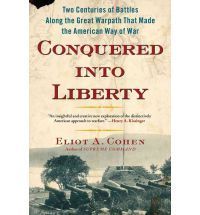
Last week I
participated in a discussion of Eliot
Cohen's new book about America's warpath between Albany, New York, and
Montreal, Canada. One of the subjects was the similarity between that era and
today's, with sustained limited wars provoked by acts of terror. Cohen made a
couple of comments that struck me:
-- When Champlain
traveled with Indians south from Canada into hostile territory, "it's not
Champlain who is the actor, it's the Indians who are the actors. The Indians
are manipulating him." Likewise, these days, it's not always about us. In the
post-9/11 world, "we are a powerful piece often being moved around their
chessboard."
--The French
did much better than the British/Americans in dealing with the Indians -- but
eventually the British/Americans got "good enough" at it to use their other
advantages to prevail
--"One of
the great strategic virtues is empathy."
I asked an
old friend to interview Professor Cohen about his new book:
Magua:
Were you inspired to write this
book by the movie version of 'Last of the Mohicans'? If not, why not?
Eliot Cohen: No, no, no. The movie is
not all that great, and James Fenimore Cooper's book is pretty problematic too
-- wooden dialogue, implausible characters, unbelievable action. But he got the
landscape right. On the other hand, it's still in print, which is more than you
can say of most other books coming on two centuries since pub date. But there
is a kernel of truth here. Kenneth Roberts was a wonderful historical novelist
whom I read when I was a teenager, and between that and a visit to Fort
Ticonderoga at age ten I got hooked. Took me some four decades to go from
fascination to published book, however.
Magua:
Hmm. [Speaking Huron] Magua is glad this guy writes books better than he
reviews movies. [Returning to the white man's tongue] Tell us a bit about this
French-Canadian character who keeps popping up, would you?
EC:
That would be La Corne St. Luc. He led raiding parties
against the Americans in three wars (King George's War, the French and Indian
War, and the Revolution) although he also offered to join them when it looked
as though we were about to take Canada in 1775. He was a brilliant leader of
Indians and may have had a role in the massacre at Fort William Henry in 1757. In
1761 he figured New France was finished and set sail for France. He was
shipwrecked off what is now Cape Breton Island, saw his two sons slip out of
his grasp and drown just before he got on shore, pulled together the half dozen
survivors, built a fire, found some Indians to take care of them, and then hiked
fifteen hundred miles or so to Quebec -- in the dead of winter -- to get more
help. Smart enough to slip away from Major General John Burgoyne's army
invading New York from Canada in 1777, just before it was surrounded and forced
to surrender to the last man. Died in 1784, aged 73 (a very ripe old age by
contemporary standards) one of the richest men in Canada, with a pretty young
wife. Quite a guy.
Magua:
The French were in so much better a position militarily. How did they blow
their hold on North America?
EC:
Numbers had a lot to do with it -- there were only 80,000 French Canadians and
about fifteen times as many English-controlled colonists in the 1750s. But the
more important explanation is the Royal Navy, which pretty much throttled the
colony during the Seven Years (French and Indian) War, and the willingness of
the British to pour vast resources into the conquest of North America. By 1759,
when Quebec fell, there were easily four or five times as many British as
French soldiers in North America, and Quebec was cut off and starving. But the
French put up a ferocious fight, and might have hung on another year or so. And,
in the supreme irony, at the decisive battle outside Quebec in 1759 their
combination of French troops, Canadian militia, and Indians actually
outnumbered the British army (almost all regulars) under James Wolfe.
Magua: Is there a
lesson for our times here?
EC:
I am wary of the idea of lessons. What the book shows, though, is just how
deeply our way of war is rooted in our past. What is now the United States has
been involved in every major global conflict since the end of the seventeenth
century, and the Great Warpath was, in many ways the decisive theater for the
North American bits of those conflicts. A lot of the ways we think about and
approach warfare emanate from the two centuries I discuss in the book,
including the paradoxical notion that one can conquer a nation into liberty. On
that particular point, see the chapter about the siege of St. Johns in 1775.
Magua:
What's the one question you wish someone would ask about this book?
EC: What was the most fun
about researching and writing it? Two answers: (a) leaving behind the pundits
(particularly the monomaniacs and wingnuts) of contemporary political discourse
and spending time -- in my head, that is -- with some great historians and
truly remarkable historical characters, including La Corne St. Luc, Benedict
Arnold, Ethan Allen, and many more; (b) walking the ground, to include
snowshoeing the Battle on Snowshoes and sailing the battle of Valcour Island.
If the book inspires lots of people to go poking around the places I write
about, I will be delighted.
Wanat: It's back
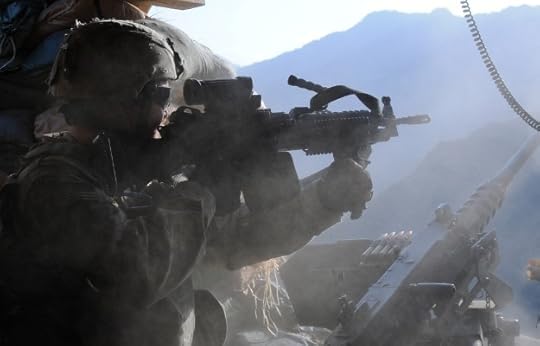
The new issue of Vanity Fair has a good overview piece by Mark "Black Hawk Down"
Bowden about the
Wanat battle and its effect on those who fought it, oversaw it and
questioned it. Here's a link
to the article.
Meanwhile, Rand Corporation surfaces
with a report
on what Wanat might tell us about small unit operations in Afghanistan. I gave
it a skim and can't tell what, if anything, to make of it. I don't want to keep
on beating up on poor Rand, but I find their reports tend to be mushy. I read
so much stuff that I want people to get to their essential points clearly,
quickly and emphatically -- as Col. Creighton Abrams did in an Army War College
paper that I was reading yesterday in Carlisle, Pennsylvania. More on that
later.
Ten tips for that Marine staff sergeant: Or, what I learned about life on terminal leave
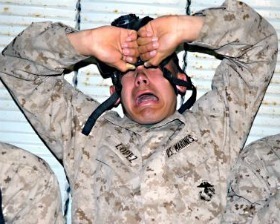
Here's a response to yesterday's
query from a Marine staff sergeant about what today's job market it like.
It is written by a Marine officer who recently made the leap to the civilian
workplace.
By Sydney Farrar
Best Defense guest advice columnist
1. Learn to market yourself in the language of
the business world. Many Marines and veterans struggle with transposing their
experiences, i.e. billet accomplishment, into the language of corporate
America. The military may not like to call officers and SNCOs "managers" but in
the eyes of many in the business world that is exactly what we are. I know we
are "leaders," but don't be afraid to use the "m word." As an
example, for grunts it often takes some creative thinking to turn a range you
planned and coordinated into business verbiage but it's more than likely that
you overcame multiple "budgetary, resource, and manpower issues" just to pull
off a single live-fire exercise. It matters. When you are writing your resume
it might be worth the time to tailor a resume for each job you want to apply
for. Don't just use a generic resume. Take the extra time to carefully read
each job description, responsibilities, etc. and then tailor your resume for
that job based on your experiences, deployments, and billets.
2. Do research and find out what companies are
actively recruiting veterans. Most companies have recruiters and H.R.
specialists devoted entirely to veterans. Reach out to them and find out about
recruiting events. For officers MOAA has events that might be worth looking
into. For junior officers membership is free. If you are thinking about a
federal job remember you must use a federal resume. If you aren't familiar with
federal resumes and/or job descriptions reach out to someone. USAJOBS.gov is
still a cumbersome website but it is getting better.
3. Having a clearance is huge. It means a
company spending less money than someone without one and the fact you can get
to work faster is a strong selling point. Get a JPAS letter from your S-2 and
be sure to include your security clearance level and dates on your resume. It is
a must if you want to transition to the contracting or government consulting
world.
4. While you are still in uniform use tuition
assistance to take self-paced Microsoft Office certifications. It would look a
lot better on a resume if you had a certification with Excel and PowerPoint
that just listing you are "proficient." The business world revolves around
Excel and PowerPoint and no matter how many rosters and live-fire confirmation
briefs you made you probably aren't anywhere near as skilled as you think you
are. Completing the certifications while still on active-duty can save you a
lot of money. Also, look into courses for SharePoint, Photoshop, etc.
5. Try and get strong letters of
recommendations from someone who can truly speak to your ability. Your company
commander or battalion commander might not be the best person despite their
rank. Also, if you list someone as a reference please make sure they are aware
of it. Sounds obvious but you would be surprised. Companies do call your
references so make sure anyone you list has your most up-to-date resume,
billet, etc. information handy. [[BREAK]]
6.
Market you ability to learn quickly and adapt, work in a fast-paced
environment, and strong work ethic assuming you have those things. A lot of
companies are willing to hire veterans in entry level positions because of the
aforementioned abilities and capabilities and teach you what they need you to
know. You may have to sell your potential not necessarily what you did in the
past. Even after ten years at war, a lot of people still have no understanding
of the military structure, so be sure to explain your billet and
responsibilities and, relating back to my second point, how they relate to the
job you are applying to.
7. Be humble! As an officer or SNCO you may
have to start in an entry-level position. If you really are as good as you say
you are then your ability will speak for itself and you will do good things and
rise to the top. It might be hard and incredibly frustrating being the junior
guy or girl in a four man team when you were a former company commander or
platoon sergeant but you need to be prepared for that possibility and accepting
of it. Just perform and hopefully you will be awarded accordingly. Also, if
there is any idea or sense of entitlement because of your service then it needs
to be dropped. People can sense it and while your service is something to be
proud but don't let it lead to being condescending. There is a lot of
competition in the job market and you have to prove yourself all over again.
8. Network. This can't be stressed enough. Talk
to former Marines and veterans and find out what worked for them when they
transitioned to the private sector. I would even cold call someone or e-mail
them even if you don't know them personally but you know they are a veteran or
former Marine. Marines are always willing to take care of each other. At least
that was my experience. Employee referrals can go a long way. Reach out to
former commanders that you know are no longer in uniform. A friend of a friend
could mean a job.
9. Be patient. You more than likely won't find
a position right away. Have a financial plan in place in the event that you
cannot find a job. Don't count out the Reserves either. The Marine Corps is
really hurting for infantry officers and SNCOs in the Reserves. Just having the
drill weekend pay check once a month could help ease your financial situation
and buy you some more time. The other great thing about the Reserves is
networking. Talk to your peers if you do transition and find out what they do.
There is a wealth of knowledge, experience, and opportunity in the Reserves.
10.
If you are going to use the GI Bill right away then have a plan of attack. I
can't tell you how many times I asked Marines that were transiting what their
plan was and it was to just "go back to school." Not acceptable. Work with the
school you want to apply to and find out what assistance they have for
veterans. The UNC, California, and Texas schools systems have outstanding
opportunities. There is an article in the New York Times about Columbia's
outreach to veterans. Also, odds are that your SAT/ACT scores are out of
date so start studying now while you are still in uniform and getting a pay
check. Depending on operational tempo do not wait until you EAS to make a plan.
By that point you are way behind schedule. You can get free SAT/ACT study
guides while on active-duty from the learning resource and career centers.
Command permitting, you could even use tuition assistance for an EMT course,
etc. Take SEPS/TAPS early and use the resources provided. Don't take it two
weeks before you EAS. There is a lot of vocational training and resources that
you won't have once you EAS.
The author is a former active duty
Marine infantry officer recently hired by a Fortune 500 consulting firm. He is
now a Reservist. The views of the writer represent the individual and not the
views of the United States Marine Corps of the Department of Defense.
November 14, 2011
A Marine staff sergeant inquires: What's it like out there in the civilian workplace?

Here's a question from a Best Defender that I answered, but
am passing along (with the permission of the sender).
I am a Staff Sergeant with 12 years in the Marine Corps
whose "fun meter" has bottomed out. I have received a B.S. in Finance
and am working on a HR certification. I read your post from November 2nd about
a former Captain having difficulty with veteran hires and it concerned me.
I have spent the last few years preparing myself to separate from active
service and am excited about a future working for a company where I can truly
feel like my efforts are helping the company succeed. Is the idea that I can
leave the military and become an all-star for a company a fantasy in today's
business climate?
My response was that it's tough out there, but that he might
have luck with a company with a reputation for hiring Marines. Suggestions?
Thomas E. Ricks's Blog
- Thomas E. Ricks's profile
- 436 followers



